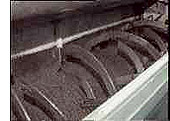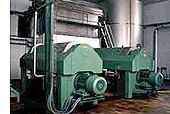|
•
 Grinding Grinding
After washing the olives,
they are crushed in order to break the tissues of the flesh and free the
oil, resulting in a homogenous paste. Depending on the technique and
machines used, this process plays a significant part in determining
overall yield and end product quality.
• Mixing
The next phase is the
mixing stage which actually concludes the above process in order to
achieve a more homogenous paste. The paste is heated in the mixer in
order to increase its viscosity which will result in a better yield.
However, it is important to ensure that the temperature does not exceed
25ºC because the essential components that determine the oil’s aroma and
quality become volatile at this temperature.
•
 Solid-liquid
separation Solid-liquid
separation
This is a modern process whereby the solid
part moves down along the shaft, and separates from the
liquid part. The solid part is continuously removed.
• Decanting, centrifuging and combined systems
The liquid obtained from the above process is
not pure oil (30%). It has to be processed in order to
eliminate a small amount of bodies that are suspended in the
liquid. This is achieved by passing the liquid through
vibrating sieves. The filtered mixture is largely of an
aqueous nature (60%). These three separation phases
(aqueous, oil and solid) are performed in order to obtain
quality oil by means of procedures such as natural decanting
(which is the oldest and most commonly-used procedure),
centrifuging, and combined systems.
|
